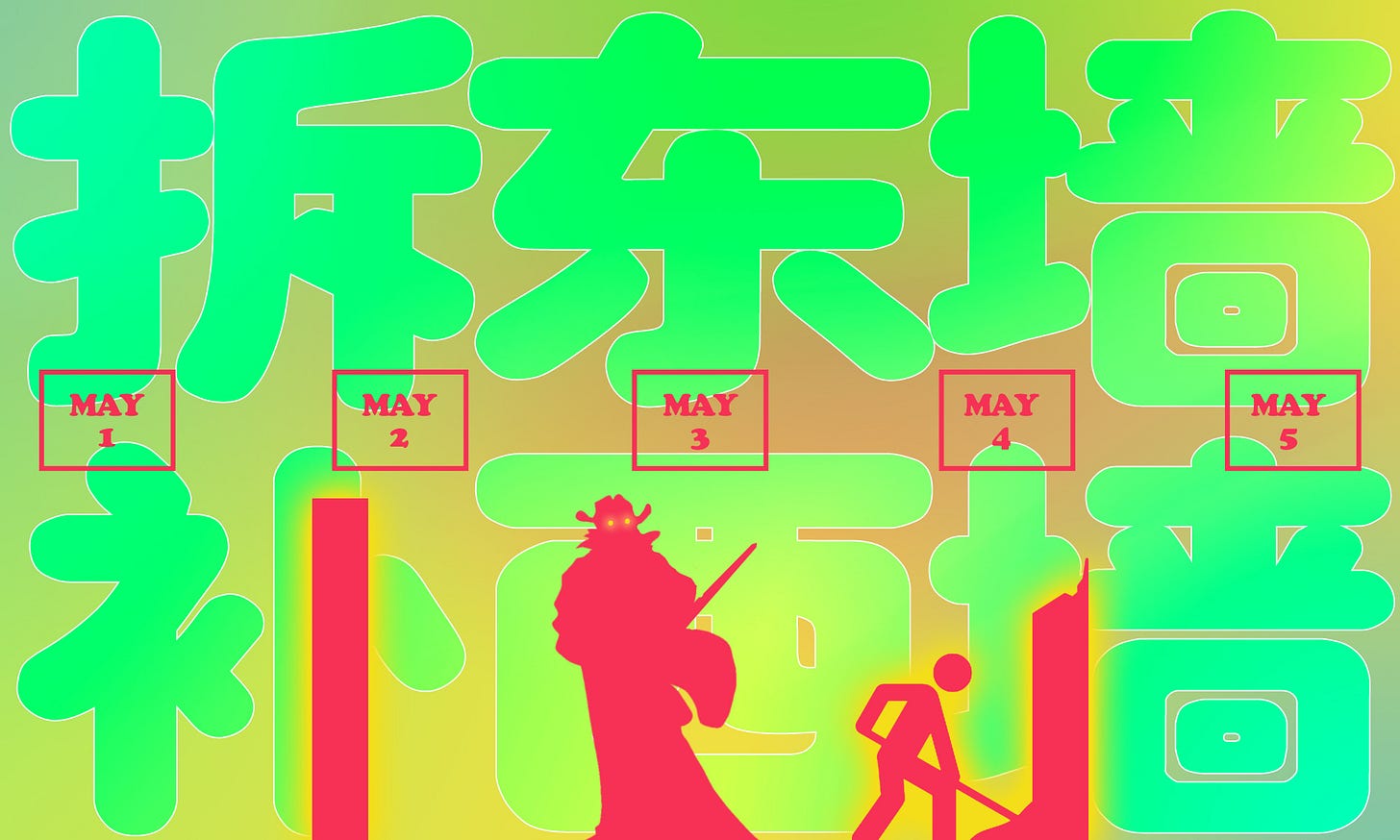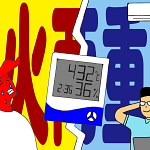Welcome to RealTime Mandarin—a multimedia resource to immerse you in the latest Chinese language trends, inspire you to practice and improve your Mandarin every week, and empower you to communicate with confidence.
Subscribe now to get the next issue straight to your inbox!
As the Labour Day holiday (劳动节 láodòng jié) in China draws to an end, frustrations about the dates of the break this year continue.
The Labour Day holiday starts on May 1, which is a Wednesday this year, and ends on May 5, a Sunday this time around.
That’s five rest days in total.
But then there are "adjustment days" on either side of the holiday, which are Sunday April 28, and Saturday May 11. People are required to work on these days, meaning two six-day weeks either side of the holiday, to "adjust" for the time-off.
So the five-day holiday for many people has been ruined by one of the most annoying things about working in China: "holiday adjustment days" (调休 tiáoxiū).
This is where National holidays involve "adjusting" (调休 tiáoxiū) weekend days into working days, to extend the holiday period by aligning holidays with weekends.
It’s been in place place since 1999 when the authorities modified the holiday system, and was updated again in 2008.
Labour Day, initially one day off, was extended to three days, and National Day, previously two days, was also extended to three days. But to achieve that, "adjusted days" were taken from weekends before and after to create one chunk of time-off.
Originally intended to provide workers with more time to rest, it became a lever to stimulate the holiday economy, giving rise to the concept of "Golden Week" (黄金周), when it feels like everyone in China is all on holiday at the same time.
Labour day is one of the three “golden week” national holidays in China.
This year, not including the two weekend days in the Labor Day break (May 4 and 5), and the two adjusted days from the weekends before and after the holiday, the break actually only offers one additional day off.
It's a "fake holiday" according to an entertaining play on words:
It's not a holiday, but a fake break.
这不是放假,而是“假放”。
Zhè búshì fàngjià, érshì “jiǎ fàng”.
The characters for "holiday" (假 jià) and "fake" (假 jiǎ) are the same, and pronounced in the same way (jia), but with a different tone.
This year there are an increasing number of voices criticising the system as out of date:
What's the point of these adjustments? Are they meant to give people rest or make workers even more exhausted?
Why invent a system where people have to win their rightful vacation time with more painful overtime?"
这个调休到底是让人休息还是让上班的人更累呢? 用更痛苦的加班换取本来就属于自己的假期到底发明出来是为了啥呢?[2]
With China's stressed economy, weakened consumer demand, and excess production capacity, consumers are spending less during national holidays. Crowded tourist destinations further deter people from going to them.
Negativity towards working culture in China also doesn’t help.
Excessive workload, overwhelming pressures, intensely competitive "996" and "007" work schedules, single and double rest days, unpaid overtime, and “hidden after-work duties” mean people are exhausted by the time they get to a national holiday.
This year's adjusted holiday days have been particularly frustrating:
We worked during the weekend to get the Qingming holiday, and now we have to put up with more overtime for the Labour Day holiday.
In order to have a 5-day vacation, we have to sacrifice one day each from the weekends before and after. Some people complained online, “With all these adjustments, we might as well put the 6-day work week in place for April.”
清明节刚调休完,接下来的五一假期,又要调休了。为了凑成一个五天小长假,只能向前后一周的周末各借一天,有网友吐槽“调休快把四月调成单休了”。
So, that's what we are exploring this week!
Favourite Five
1. 破防 pò fáng
burst into tears; overwhelmed
调休又又又上热搜了,打工人又又又破防了- Holiday days adjustment is trending on Weibo again, and working people are once again upset. [1]
2. 假放 jiǎ fàng
take a fake holiday
网友们认为,这不是放假,而是“假放” - Netizens believe that this is not a real holiday, but rather a fake break. [2]
3. 朝三暮四 zhāo sān mù sì
say three in the morning and four in the evening; keep changing
调来调去,不过是朝三暮四的数字游戏 - Holiday days adjustment is just a game of changing the numbers around. [1]
4. 既要马儿跑,又要马儿不吃草 jì yào mǎ ér pǎo, yòu yào mǎ ér bù chī cǎo
want the horse to run, but also don’t want to feed the horse; have the cake and eat it
想让马儿跑又不给马儿吃草,想让你消费又不想给你发钱 - The government want you to spend but don't want to give you money, just like wanting the horse to run but refusing to feed it. [2]
5. 拆东墙补西墙 chāi dōng qiáng bǔ xī qiáng
tearing down the east wall to fix the west wall
人们期待更多的假期,而不是“拆东墙补西墙”的调休 - People want more holidays and they are tired of the existing practice of "tearing down the east wall to repair the west wall", i.e. borrowing weekend days to seemingly extend a holiday. [3]
More: Read more about this phrase in the Sinica Phrase of the Week tomorrow
Consuming the Conversations
Useful words
6. 调休 tiáo xiū
holiday days adjustment
调休的安排,原本是让劳动者更好地休息,现在变成了一种撬动假日经济的杠杆 - Holiday days adjustment was originally intended to allow workers to rest better, but now it has become a lever to stimulate the holiday economy.
Related:
单休 dān xiū - 6-day work week (or one-day weekend)
7. 拼假 pīn jià
adjust rest days to extend vacation
人山人海的热闹景象,似乎也坐实了调休拼假的“正确” - The bustling scenes of crowds appear to confirm that the adjusting rest days for longer vacation is the right decision. [1]
8. 干瘪 gān biě
shrivelled; depleted
我的钱包已经很干瘪了,为什么你们还要想着掏空它 - My wallet is already empty, so why do you still want me to spend more? [1]
9. 优解 yōu jiě
optimal solution
多放两天假,效率提上来,恐怕才是优解 - The optimal solution is probably to give workers two more days off, which can increase their productivity. [2]
Three-character phrases
10. 凑假期 còu jià qī
borrow rest days for a longer holiday
“凑假期”的方式,打乱了原本规律的工作节奏,造成身体疲惫 - Borrowing rest days for a longer holiday disrupts the regular work rhythm, which leads to physical fatigue. [2]
Related:
硬凑 yìng còu - forcefully put together
东拼西凑 dōng pīn xī còu - piece together haphazardly
11. 获得感 huò dé gǎn
sense of gain
问题是,为什么假期增多了,公众的获得感反而减低了? - The question is, why has the public's sense of gain decreased even though there are more holidays? [2]
Related:
松弛感 sōngchí gǎn - relaxed feeling
幸福感 xìngfú gǎn - a feeling of happiness
12. 伤不起 shāng bù qǐ
can't afford to get hurt; can't take it
假期前后上了三个“六天班”,上班族“伤不起” - Working three 6-day weeks before and after the holiday, office workers really can't take it. [3]
Note: A common internet slang phrase.
Idioms
13. 众口难调 zhòng kǒu nán tiáo
difficult to please everyone















